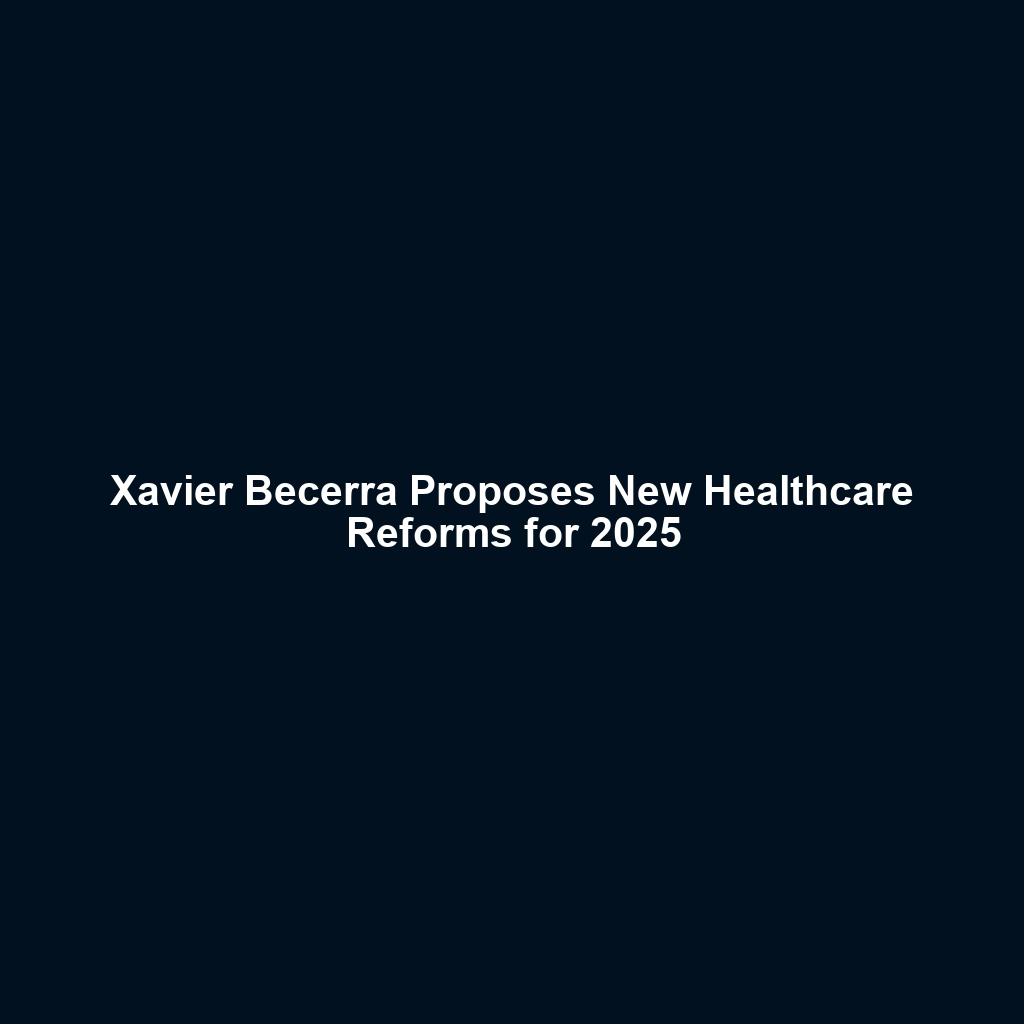Your cart is currently empty!
Xavier Becerra Proposes New Healthcare Reforms for 2025

Xavier Becerra Proposes New Healthcare Reforms for 2025
In a high-profile announcement earlier this week, U.S. Secretary of Health and Human Services (HHS) Xavier Becerra unveiled a series of ambitious healthcare reform proposals aimed at improving affordability and accessibility within the U.S. healthcare system. The reform agenda, which targets implementation by 2025, seeks to address the mounting challenges faced by millions of American citizens, particularly in light of rising healthcare costs and disparities in access to care.
Overview of Proposed Reforms
Becerra’s proposed reforms consist of several key initiatives designed to broaden insurance coverage, reduce prescription drug prices, and strengthen the overall healthcare infrastructure. Among the most notable proposals are:
- Expansion of Medicaid: Becerra seeks to expand Medicaid coverage to more low-income individuals across the nation, thereby reducing the number of uninsured Americans.
- Prescription Drug Pricing Reform: The plan includes measures to limit out-of-pocket expenses for prescription medications, enforcing price negotiations to ensure fair pricing.
- Investment in Telehealth Services: In response to the increased demand for remote healthcare services, the reforms propose significant investments in telehealth capabilities, making healthcare accessible to rural and underserved communities.
- Health Equity Initiatives: Targeting systemic inequities, the reform includes initiatives to improve access to care for marginalized populations, particularly Black, Indigenous, and other people of color.
The Need for Reform
Becerra’s proposals arrive at a crucial time as the U.S. healthcare system continues to grapple with rising costs and access disparities. According to a recent report from the Kaiser Family Foundation, nearly 30 million Americans remain uninsured, while those with insurance face exorbitant out-of-pocket expenses that often deter them from seeking necessary healthcare.
The COVID-19 pandemic has exacerbated these issues, underscoring the vital need for a comprehensive overhaul of the healthcare system that prioritizes patients’ financial and medical well-being. “We cannot afford to leave so many of our neighbors behind,” Becerra stated during the announcement, highlighting the urgent nature of these reforms.
Key Components of the Reform Agenda
Medicaid Expansion
One of the cornerstone elements of Becerra’s proposals is the expansion of Medicaid eligibility. Currently, states have the option to expand Medicaid under the Affordable Care Act, yet many—including several Republican-controlled states—have opted out, leaving millions without coverage. Becerra’s proposal aims to encourage these states to expand their programs through federal incentives.
Prescription Drug Pricing Reform
Another major aspect of the reform is focused on prescription drug pricing. The Administration plans to implement strategies similar to those adopted in countries with lower drug prices, such as setting limits on insulin costs and enabling Medicare to negotiate prices for high-cost medications. These steps are anticipated to greatly reduce financial burdens on patients and improve adherence to medication regimens.
Investment in Telehealth
Becerra’s agenda also includes a strong focus on telehealth services, which became a lifeline for many during the pandemic. The proposal outlines significant funding aimed at expanding telehealth infrastructure, making it easier for patients in rural areas or those facing mobility challenges to access necessary healthcare services.
Health Equity Initiatives
Furthermore, the reforms emphasize health equity. Becerra highlighted the persistent disparities in healthcare access and outcomes experienced by minority groups, stating, “Healthcare should be a right, not a privilege.” The proposed initiatives seek to invest in community health resources, workforce development, and culturally competent care practices.
Reactions from Stakeholders
Reactions to Becerra’s proposed reforms have been largely positive among healthcare advocates who view these changes as a step toward a more equitable healthcare system. The American Association of Health Plans (AAHP) expressed support, stating that greater access to affordable care is vital for the nation’s future, particularly as it emerges from the pandemic.
However, some lawmakers and industry stakeholders have raised concerns regarding potential costs associated with these reforms. Critics argue that increased federal spending and regulatory changes could burden state budgets and stifle innovation within the healthcare sector. “While the goals are admirable, we must also ensure that reforms do not unintentionally lead to negative consequences,” said Senator John Barrasso, a leading voice within the Republican party regarding healthcare policy.
Conclusion
Xavier Becerra’s proposed healthcare reforms for 2025 mark a significant shift in the U.S. healthcare landscape, aiming to bolster affordability and accessibility for millions of Americans. As the proposal navigates through legislative processes in the coming months, the focus will remain on balancing the ambitious goals with practical implementation strategies that address concerns from various stakeholders.
As the discourse surrounding these reforms continues, it will be crucial for all parties involved to engage in constructive dialogue aimed at refining the proposals to best serve the diverse needs of the American population while ensuring the sustainability of the healthcare system.
Leave a Reply